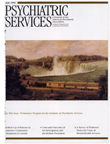Incidence of and risk factors for delirium among psychiatric inpatients
Abstract
OBJECTIVE: The presence and effects of delirium among psychiatric patients are not well understood. This study investigated incidence rates and risk factors for delirium among hospitalized psychiatric patients. METHODS: The charts of 199 patients admitted over a one-year period to a tertiary care teaching hospital were retrospectively reviewed. Demographic and medication variables were analyzed using multiple logistic regression. Delirium was diagnosed retrospectively using DSM-III-R criteria. RESULTS: The overall incidence of delirium in the study sample was 14.6 percent. Delirium was most common among patients with schizophrenia and bipolar disorder; patients with bipolar disorder had the highest incidence (35.5 percent). Only 48 percent of delirious patients were actually recognized as having delirium at the time it occurred. Antiparkinsonian medications were the only medications significantly associated with delirium; lithium was not an independent risk factor. Older age was the only significant demographic risk variable. The hospital stays of patients with delirium were 62.1 percent longer than those of patients without delirium. CONCLUSIONS: Patients with bipolar disorder appeared to be at higher risk for developing delirium, whether or not lithium was used in treatment. This finding may reflect an inherent predisposition to delirium among these patients. Alternatively, the combination of medications used in treating patients with bipolar disorder may be a risk factor.
Access content
To read the fulltext, please use one of the options below to sign in or purchase access.- Personal login
- Institutional Login
- Sign in via OpenAthens
- Register for access
-
Please login/register if you wish to pair your device and check access availability.
Not a subscriber?
PsychiatryOnline subscription options offer access to the DSM-5 library, books, journals, CME, and patient resources. This all-in-one virtual library provides psychiatrists and mental health professionals with key resources for diagnosis, treatment, research, and professional development.
Need more help? PsychiatryOnline Customer Service may be reached by emailing [email protected] or by calling 800-368-5777 (in the U.S.) or 703-907-7322 (outside the U.S.).



